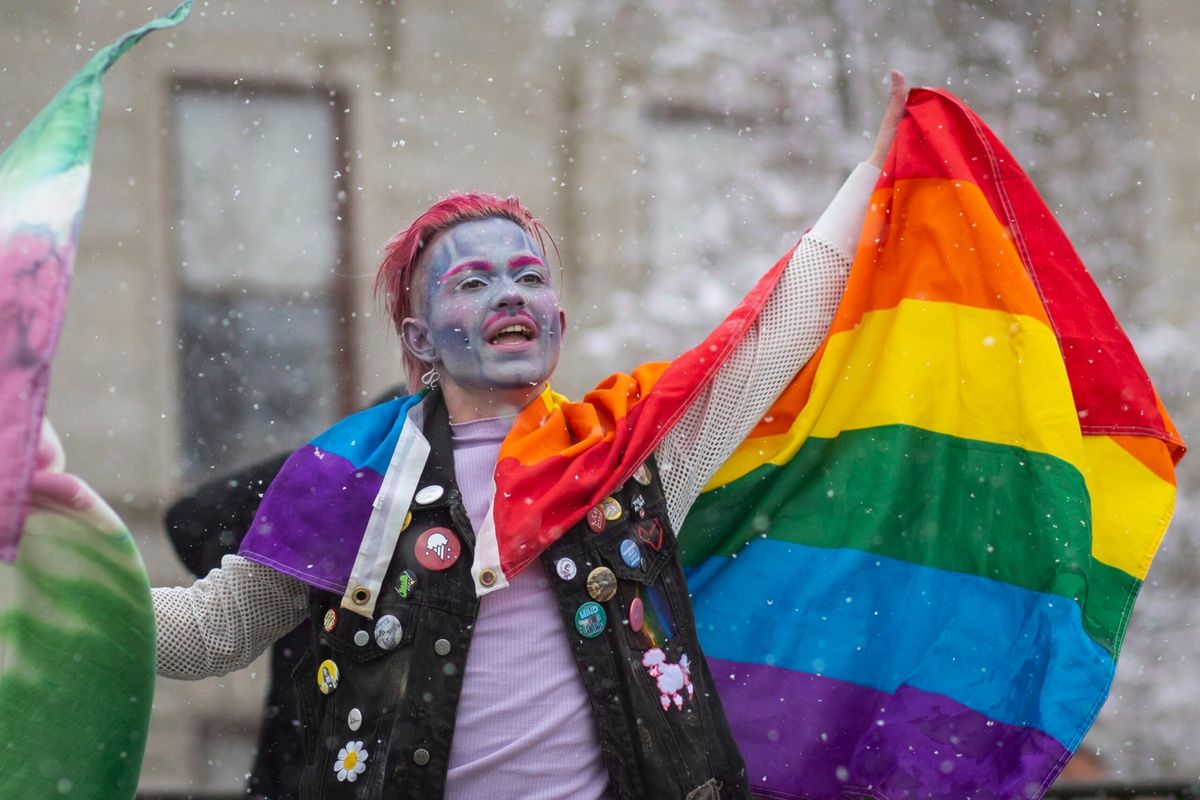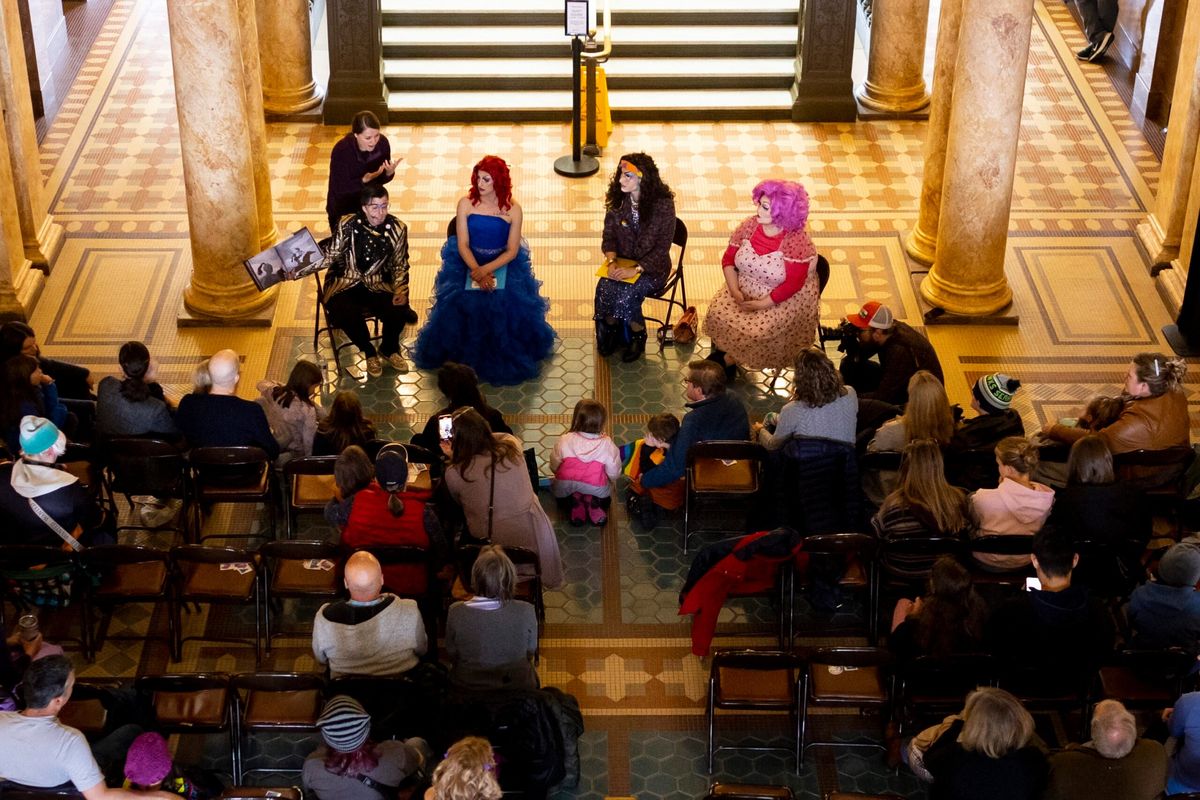Drag show, story hour performers protest anti-LGBTQ legislation as bills advance
Rex Pistols performs with a rainbow flag during a drag show and protest in front of the Montana State Capitol in Helena on Thursday. (Mike Clark/For the Daily Montanan)
Drag performer Butch took off their jacket to reveal a T-shirt reading “I am not a crime” during a drag show protest on the Montana Capitol building front steps.
“Drag is art. Drag has been here forever,” performer Ivita said. “These bills are an attack on trans rights, and it is just another pathetic attempt to dehumanize the queer community more.”
An estimated 140 protesters watched as drag queens, kings and goddesses lip synched and danced in front of the statehouse, an act that would be deemed illegal if a bill banning drag on public property were to pass.
The Senate Judiciary Committee passed House Bill 359 out of committee on Thursday with an amendment brought by Rep. Braxton Mitchell, R-Columbia Falls, who sponsored the legislation addressing drag shows.
Another bill defining sex by reproductive organs was heard in the House Judiciary Committee the same morning. The bills are part of what has been deemed by organizations like the Montana Human Rights Network the “Slate of Hate” for targeting the LGBTQ+ community in the state.
“This legislative session we have more anti-LGBTQ bills than ever before,” Shawn Reagor with the Human Rights Network said into the mic during the protest. “What is happening right here and now? Illegal.”
Bill to ban drag in Montana
The Senate Judiciary Committee voted to add an amendment to Mitchell’s drag ban bill that included an immediate effective date as well as additional definitions including:
The amendment also adjusts the definition of drag performance to include “obscene” as defined in code.
Sen. Chris Friedel, R-Billings, referred to Mitchell’s amendment as the “Tennessee amendment” and warned that the Tennessee bill is tied up in the courts. The original language from the bill was taken from Tennessee and Texas, drafting emails showed.
Sen. Barry Usher, R-Billings, said since this bill dealt with public property and not private, Montana would avoid that fate. The bill language says any bar or restaurant that hosts a drag show would be considered a “sexually oriented business.”
Friedel responded he still had First Amendment concerns.
“If I had struck everything that said drag queen out of here and put Christian youth group would you be offended – would you still vote for the bill?” Friedel asked.
Freidel was the only Republican to join Democrats in voting against the amendment.
Sen. Jen Gross, D-Billings, said it wasn’t any secret she didn’t like the bill.
“I just think this amendment really muddies the waters, and we’re not getting around any sort of First Amendment issues by putting this amendment on the bill,” Gross said.
The bill passed 7-4 on party lines.
Sen. Andrea Olsen, D-Missoula, a Democrat on the committee, was one of a handful of Senators to attend the drag show following the vote on Mitchell’s bill.
“I believe it’s unconstitutional on many grounds, most of all, importantly, the right to dignity, the right to equal protection and clearly the right to free speech,” she told the Daily Montanan. “It’s a bill that shows that we misunderstand the very people we represent.”
Retired elementary school music teacher Margaret O’Connor held a sign that read “Love, not hate makes America Great.”
“It’s ridiculous,” said O’Connor on anti-LGBTQ+ legislation, like the bill to permit misgendering children in school. “I mean, way to take the soul out of kids.”
There was one counterprotester at the event identified by Reagor to the Daily Montanan as a Proud Boy, who left shortly after shouting at performers at the beginning of the performance.
The Montana Human Rights Network monitors extremist groups like the Proud Boys in the state.
Defining sex in statute
Reagor said during the rally that Senate Bill 458, sponsored by Sen. Carl Glimm, R-Kila, that defines sex in Montana statute, is a “mis-defining sex bill.”
“And it mis-defines sex because some of these legislators seem so mystified by sex,” Reagor said.
During the hearing for SB 458, nine proponents and 26 opponents testified. Proponents included the Montana Family Foundation, which was involved in drafting the bill, and two pastors. Opponents included the Human Rights Campaign, the Montana chapter of the American Academy of Pediatrics, the ACLU of Montana, the Montana Budget and Policy Center and Planned Parenthood of Montana, among others.
The fiscal note for the definition bill has come under some scrutiny after the Governor’s Budget Office said there would be no fiscal impact to the state under the bill. Democrats requested the Legislative Fiscal Division take a deeper look at the bill’s potential financial impact to the state, and they said due to the conflict with federal law, it could potentially risk half the state’s budget – $7.5 billion.
The conflict stems from the U.S. Supreme Court’s 2020 Bostock vs. Clayton County decision, which prohibits discrimination in employment based on biological sex, failure to conform with sex stereotypes, sexual orientation and gender identity.
Rep. SJ Howell, D-Missoula, who identifies as nonbinary, asked Glimm if he thought risking half the state’s budget was worth it.
“I don’t feel like there’s a risk here,” Glimm said.
Proponents for the bill said SB 458 was necessary because sex and gender have been conflated in code and that sex is binary, and surgeries cannot change sex.
Rep. Jodee Etchart, R-Billings, asked Dr. Lauren Wilson, president of the Montana chapter of the American Association of Pediatrics, a series of questions about the percentage of the population impacted by disorders of sexual development.
Wilson said 1.4% of the population, but Etchart said the National Institute of Health had it at .02% of the population. Wilson said that the NIH definition is narrow, saying it only includes people she said were “true hermaphrodites,” or people with both male and female sexual organs.
Howell later asked SK Rossi with the Human Rights Campaign if the law allowed for discrimination against a small percentage of the population.
“No,” Rossi said.
Glimm previously said the genesis for the bill was after legislation he brought during the 2021 session, Senate Bill 280, was temporarily enjoined in Yellowstone County District Court.
SB 280 said people who are transgender can’t change the gender marker on their birth certificate.
Transgender woman Rep. Zooey Zephyr, D-Missoula, made a short comment following the hearing.
“I hope the committee, the rest of the members of the committee, never have to sit through a hearing where you’re attempted to be removed from the Montana code,” she said.
The committee did not take immediate action on the bill.
Drag story hour
A drag story hour was held as part of the line of protest events at the Capitol on Thursday, another event that would be illegal if HB 359 passes.
Performers read titles like “Prince & Knight” and “My Shadow is Pink” and taught sign language for how to say drag queen, drag queen and drag goddess, among other signs.
Lauren Caldwell brought her two children with her to the story hour. Her youngest, Eliot, was celebrating his first birthday Thursday.
“I want them to grow up in an accepting world,” Caldwell said. “And a world where they feel loved no matter who they are, and I think this is a great opportunity to show that, show them that world.”
When asked what she would say to parents hesitant to bring their kids to events like Drag Story Hour, Caldwell said they should find room in their hearts to give events like this a chance.
“Then they could see that they’re about love and acceptance and celebration of humanity, that we all should be able to get behind,” she said.
Daily Montanan is part of States Newsroom, a network of news bureaus supported by grants and a coalition of donors as a 501c(3) public charity.

